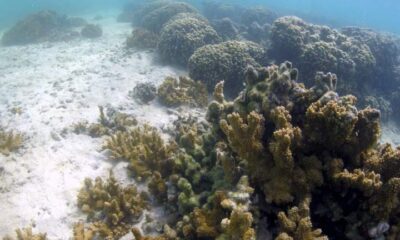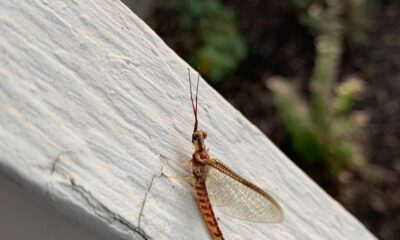Science
Sharks’ Teeth Weakened by Ocean Acidification, Threatening Ecosystems

Scientists are raising alarms about the impact of ocean acidification on sharks, revealing that these apex predators are losing their bite. Research indicates that the increasing acidity of the oceans, driven by climate change, is causing structural weaknesses in shark teeth. As a result, these vital hunting tools are becoming more susceptible to damage, posing a risk to the sharks’ effectiveness in their role within the marine food chain.
Understanding Ocean Acidification
Ocean acidification refers to the long-term decrease in seawater pH levels, primarily caused by the absorption of carbon dioxide from the atmosphere. When carbon dioxide dissolves in seawater, it alters the carbonate chemistry essential for many marine organisms to develop shells and skeletons. According to the study published in the journal Frontiers in Marine Science, sharks’ teeth, while composed of highly mineralized phosphates, are not immune to these changes.
First author, Maximilian Baum, explains that the ability of sharks to regrow teeth may not be sufficient to counteract the challenges posed by increasingly acidic oceans. The research conducted in Germany examined how various levels of ocean acidity affect the teeth of Blacktip reef sharks, revealing that more acidic conditions lead to increased brittleness and structural degradation.
Research Findings and Methodology
The study focused on discarded teeth from non-living mineralized tissue, which meant that the researchers could not consider the repair processes that occur in living sharks. To conduct their experiment, divers collected over 600 discarded teeth from an aquarium housing the sharks. They specifically selected 16 intact teeth for the pH experiment and utilized an additional 36 teeth to measure circumference changes.
The selected teeth were incubated for eight weeks in two separate 20-liter tanks with differing pH levels. The findings were striking; teeth exposed to more acidic water experienced significant damage compared to those incubated at 8.1 pH. Scientists documented visible surface damage, including cracks, holes, and increased root corrosion. Notably, the circumference of teeth in less acidic conditions was greater, although the teeth themselves did not actually grow. Instead, the irregular surface structure made them appear larger in two-dimensional images.
While altered tooth surfaces may enhance cutting efficiency, this also raises concerns about the overall structural integrity. Weaker teeth could compromise sharks’ ability to hunt effectively, affecting not only their survival but also the balance of the marine ecosystem.
Next Steps in Research
Future studies are planned to further investigate the effects of ocean acidification on the teeth, chemical structure, and mechanical resilience of live sharks. The current findings indicate that even microscopic damage could have significant implications for sharks that rely on their teeth for survival.
This research sheds light on the broader implications of climate change on marine life and underscores the urgent need for conservation measures to protect vulnerable ocean ecosystems. The full study can be found in Frontiers in Marine Science, titled “Simulated ocean acidification affects shark tooth morphology.”
As the impacts of climate change become increasingly evident, understanding these dynamics is essential for the preservation of marine biodiversity and the health of oceanic environments.
-

 Politics4 weeks ago
Politics4 weeks agoSecwepemc First Nation Seeks Aboriginal Title Over Kamloops Area
-

 World5 months ago
World5 months agoScientists Unearth Ancient Antarctic Ice to Unlock Climate Secrets
-

 Entertainment5 months ago
Entertainment5 months agoTrump and McCormick to Announce $70 Billion Energy Investments
-

 Science5 months ago
Science5 months agoFour Astronauts Return to Earth After International Space Station Mission
-

 Lifestyle5 months ago
Lifestyle5 months agoTransLink Launches Food Truck Program to Boost Revenue in Vancouver
-

 Technology3 months ago
Technology3 months agoApple Notes Enhances Functionality with Markdown Support in macOS 26
-

 Lifestyle3 months ago
Lifestyle3 months agoManitoba’s Burger Champion Shines Again Amid Dining Innovations
-

 Top Stories2 months ago
Top Stories2 months agoUrgent Update: Fatal Crash on Highway 99 Claims Life of Pitt Meadows Man
-

 Politics4 months ago
Politics4 months agoUkrainian Tennis Star Elina Svitolina Faces Death Threats Online
-

 Sports5 months ago
Sports5 months agoSearch Underway for Missing Hunter Amid Hokkaido Bear Emergency
-

 Politics5 months ago
Politics5 months agoCarney Engages First Nations Leaders at Development Law Summit
-

 Technology5 months ago
Technology5 months agoFrosthaven Launches Early Access on July 31, 2025





















